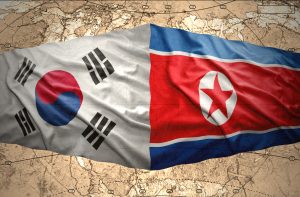Four days after North Korea reported that it officially promulgated a law to support its nuclear force and nuclear developments, South Korea publicly displayed a hawkish response.
“[We] warn that North Korea will face the overwhelming response of the South Korea-U.S. alliance and will be on the road of self-destruction if it attempts to use nuclear weapons,” Moon Hong-sik, the deputy spokesperson of Seoul’s Defense Ministry, said on Tuesday.
Moon said that Seoul would strengthen the extended deterrence of the South Korea-U.S. alliance through close coordination with Washington. With the groundbreaking expansion of the South’s “three-axis system” and the establishment of the strategic command, Seoul would enhance its deterrent force, thereby ensuring North Korea cannot use nuclear weapons, Moon added.
Speaking for the United States, White House Press Secretary Karine Jean-Pierre said the Biden administration’s “policy remains unchanged” despite Pyongyang’s new nuclear forces law, which declares its nuclear weapons status to be “irreversible.” She also reaffirmed the White House’s will to closely coordinate with its allies in the region to advance “the complete denuclearization of the Korean Peninsula.” Although North Korea has not responded to its diplomatic overtures, Jean-Pierre also reiterated that Washington is ready to meet Pyongyang with no preconditions.
Brigadier General Pat Ryder, the Pentagon press secretary, said that the U.S. has “a tried and true policy and process,” including coordination with allies, to ensure nuclear deterrence against North Korea. Calling Kim Jong Un’s recent remarks “indicative of the unhelpful and destabilizing comments that we’ve seen come from North Korea in the past,” Ryder emphasized Washington’s efforts to “continue to closely monitor and work with our partners and allies in the region” to tackle North Korea issues.
Since U.S. President Joe Biden took office in 2021, Washington has reached out to Pyongyang to renew the deadlocked nuclear talks. However, as then-U.S. President Donald Trump rejected Kim’s offer and walked out of the 2019 Hanoi summit, North Korea has argued that the U.S. should make concessions first to restore dialogue.
South Korean President Yoon Suk-yeol has followed an approach similar to Washington’s. Although he used provocative words against North Korea during his presidential campaign, his administration has offered to hold talks with North Korea since he took office in May. However, Kim Yo Jong, the powerful sister of Kim Jong Un, made crystal clear that no inter-Korean dialogue will be held during Yoon’s term by saying that the North simply does not like Yoon himself.
Due to Kim Jong Un’s firm stance on complete nuclear armament, some experts have started suggesting the South Korean government acquire its own nuclear weapons or sign an agreement with the U.S. to use its tactical nuclear weapons when necessary. North Korea has consistently developed its nuclear weapons for decades, with neither dovish nor hawkish approaches from different South Korean governments able to completely deter the North’s nuclear threats against the country. Although Washington is committed to protect the South from a North Korean nuclear attack, those who demand Seoul develop indigenous nuclear weapons argue that Washington may decide to stay out a conflict if its mainland can be targeted by the North’s nuclear attack. Thus, amid North Korea’s growing nuclear and missile threats, more and more experts and Koreans are demanding Seoul to pursue its own nuclear power status.
However, South Korea cannot develop nuclear weapons as it is a state member of the Non-Proliferation Treaty (NPT). Also, since the United States withdrew its tactical nuclear weapons from the South’s soil in the early 1990s, it has never supported Seoul to acquire nuclear weapons, fearing that South Korea’s nuclear development could lead other countries in the region to seek nuclear armament.
In this context, the Yoon administration has mainly sought to strengthen its military alliance with the United States, the long-favored policy of conservative South Korean governments for tackling North Korea’s nuclear and missile threats.
Later this week, Seoul’s vice ministers of foreign affairs and defense will hold the vice-ministerial Extended Deterrence Strategy and Consultation Group (EDSCG) meeting in Washington. They will discuss bilateral responses to North Korea’s threats, including the regular deployment of U.S. strategic assets on the South’s soil and its military capability to defend the South against the North’s nuclear and missile threats.
This Friday’s EDSCG is the third meeting since the group was established in December 2016. The last meeting was held in Washington in January 2018. Under the peace process of then-South Korean President Moon Jae-in, Seoul and Washington temporarily halted the EDSCG meeting in order to avoid provoking North Korea.
As Washington and Seoul keep using the failed two-pronged approach to tackle the North’s nuclear and missile threats – beefing up military preparations alongside offers of dialogue – we should expect Pyongyang to continue on the same trajectory. That will likely involve testing its nuclear weapons and showcasing more advanced nuclear weapons in the coming years.
































